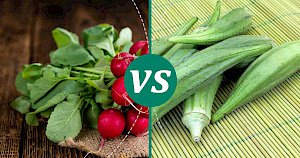Okra vs Radish: Nutrition & Calories Compare


Okra vs Radish
Nutrition Facts
Serving size:
change
5g10g15g20g30g40g50g60g80g100g120g140g160g180g200g220g250g300g350g400g450g500g600g700g800g900g1000g
1oz2oz3oz4oz5oz6oz7oz8oz10oz12oz15oz20oz25oz30oz35oz40oz50oz
Amount Per Serving:
Serving size:
change
5g10g15g20g30g40g50g60g80g100g120g140g160g180g200g220g250g300g350g400g450g500g600g700g800g900g1000g
1oz2oz3oz4oz5oz6oz7oz8oz10oz12oz15oz20oz25oz30oz35oz40oz50oz
Amount Per Serving:
Okra vs Radish 100g Compare
| per 100g | Okra | Radish |
|---|---|---|
| Calories | 33 | 16 |
| Carbohydrates | 7.5 g | 3.4 g |
| Fat | 0.1 g | 0.1 g |
| Dietary fiber | 3.8 g | 1.6 g |
| Protein | 2 g | 0.68 g |
| Calcium | 81 mg | 25 mg |
| Iron | 0.8 mg | 0.34 mg |
| Magnessium | 57 mg | 10 mg |
| Potassium | 303 mg | 233 mg |
| Sodium | 8 mg | 39 mg |
| Zink | 0.6 mg | 0.28 mg |
| Vitaminium A | 375 µg | 7 µg |
| Vitaminium B2 (riboflavin) | 0.06 mg | 0.039 mg |
| Vitaminium B3 (Niacin) | 1 mg | 0.254 mg |
| Vitaminium B6 | 0.215 mg | 0.071 mg |
| Vitaminium B9 (Folic acid) | 88 mg | 25 mg |
| Vitaminium C | 21.1 mg | 14.8 mg |
| Vitaminium K | 53 µg | 1.3 µg |
Discover the Nutritional Gems: Okra and Radish
When it comes to filling your plate with vibrant, nutrient-dense vegetables, okra and radish stand out for their unique flavors and health benefits. While they may occupy different culinary spaces – okra being a staple in dishes from the American South to Africa and South Asia, and radish being a crunchy, peppery addition to salads and side dishes worldwide – comparing them reveals a fascinating nutritional landscape.
A Closer Look at Okra
Okra, with its distinctive green pods and mucilaginous texture, is often celebrated for its role in comfort foods like gumbo. However, its nutritional profile is equally impressive. A serving of okra provides a good dose of fiber, vitamins, and minerals. Notably, it's an excellent source of vitamin C, vitamin K, and folate, making it a powerful ally for immune health, bone strength, and prenatal nutrition.
Radish: The Crunchy Powerhouse
Radishes, on the other hand, bring a refreshing crunch and a peppery kick to the table. They are remarkably low in calories, making them an ideal snack for weight management. Despite their modest size, radishes pack a punch in terms of vitamin C and potassium, essential for maintaining healthy blood pressure levels and supporting cardiovascular health.
Nutritional Face-Off
When comparing okra and radish, it's clear that both vegetables offer unique benefits. Okra is higher in calories, with 33 calories per serving compared to radish's 16 calories, but it also boasts a more robust nutrient profile. With 7.5g of carbohydrates and 3.8g of fiber, okra is a great option for those looking to support digestive health. Radish, with 3.4g of carbohydrates and 1.6g of fiber, offers a lighter, yet still nutritious, option.
Both vegetables are low in fat, with only 0.1g per serving, and are cholesterol-free, supporting heart health. However, okra takes the lead in protein content, offering 2g compared to radish's 0.68g, making it a slightly better option for muscle maintenance and growth.
In terms of vitamins and minerals, okra outshines radish with higher levels of calcium, magnesium, potassium, and vitamins A, C, and K. These nutrients contribute to okra's ability to support bone health, immune function, and vision. Radish, while not as nutrient-dense, still provides a good source of vitamin C and potassium.
What Should You Choose?
The choice between okra and radish ultimately depends on your nutritional needs and taste preferences. If you're looking for a low-calorie option to add crunch and zest to your meals, radish is a perfect choice. On the other hand, if you're seeking a vegetable that can contribute more significantly to your daily nutrient intake, okra is the way to go.
Regardless of your choice, incorporating a variety of vegetables into your diet is key to obtaining a broad spectrum of nutrients. Both okra and radish, with their unique flavors and health benefits, make excellent additions to a balanced and colorful diet.
Okra 100g
33kcalCalories source
- 77% CARBS.
- 21% PROTEIN
- 2% FAT
Radish 100g
16kcalCalories source
- 79% CARBS
- 16% PROTEIN
- 5% FAT
Compares of okra
- Okra vs Asparagus
- Okra vs Beetroot
- Okra vs Bitter Melon
- Okra vs Bok Choy
- Okra vs Broccoli
- Okra vs Brussels Sprouts
- see all compares of okra
Marcin Piotrowicz
calories-info.com creator
Healthy diet and healthy lifestyle promoter
Add comment